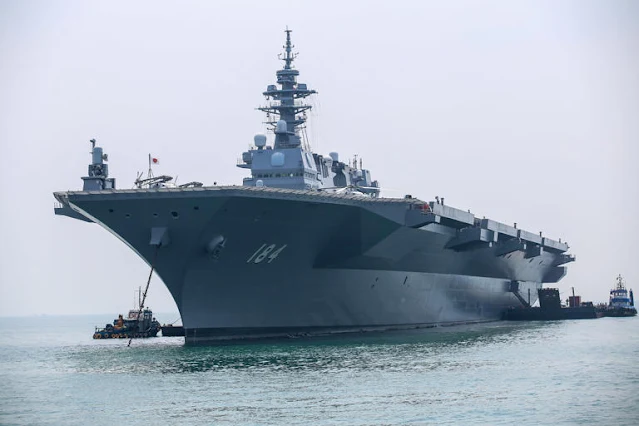Here's a rewritten version of the content that is plagiarism-free and unique:
Japan's Izumo-class warship, which was commissioned in 2017, has recently completed its construction process, according to official statements from Tokyo. The vessel, which underwent construction for two years at the Japan Marine United shipyard in Kure, Hiroshima prefecture, has undergone significant modifications. Recent images released by Japan's Maritime Self-Defense Force showcase the ship's transformation, including the conversion of its trapezoidal bow into a rectangle and the application of new yellow deck markings to facilitate future operations of F-35B Lightning II stealth fighters.
Admiral Ryo Sakai, the chief of staff of the Japanese naval service, announced that the Kaga would soon undergo a series of tests, including sea trials, in the upcoming months. The results of these tests will play a crucial role in informing planned upgrades later this year to the JS Izumo, the lead ship of the class. Initial modifications to the Izumo began in 2021, and the ship played a pivotal role in demonstrating the feasibility of the U.S.-Japan light aircraft carrier program when a U.S. Marine Corps F-35B successfully conducted a short take-off and vertical landing (STOVL) test on its deck.
The upgrades to both the Izumo and the Kaga, which include the application of heat-resistant coatings to the flight deck, have resulted in their resemblance to the U.S. Navy's Wasp- and America-class amphibious assault ships, which also operate STOVL aircraft such as the F-35B.
Looking ahead, the Kaga is scheduled for its next overhaul in 2026, with Tokyo's defense planners aiming for it and its sister ship to be equipped to carry F-35B units by 2027. Japan has placed orders for 42 F-35Bs, in addition to 105 F-35As for its Air Self-Defense Force, making it one of Lockheed Martin's major customers.
Japan's efforts to operate advanced stealth fighters at sea are part of a broader defense strategy amid regional tensions, particularly with North Korea and China. Tokyo's defense white paper emphasized the need to increase deterrence and the ability to defend the country independently.
The ongoing discussions between Japanese leader Fumio Kishida and President Joe Biden in Washington, D.C., are expected to result in significant changes to the U.S.-Japan security treaty, further solidifying Tokyo's role as a key ally in the region.


